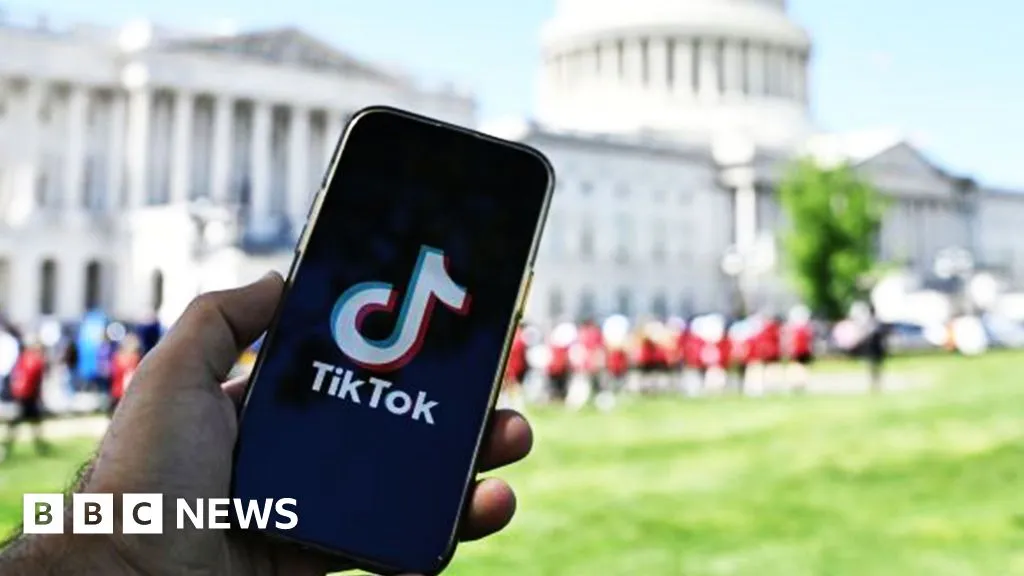- cross-posted to:
- technology@beehaw.org
- usa@lemmy.ml
- news@lemmy.world
- cross-posted to:
- technology@beehaw.org
- usa@lemmy.ml
- news@lemmy.world
TikTok says it offered the US government the power to shut the platform down in an attempt to address lawmakers’ data protection and national security concerns.
It disclosed the “kill switch” offer, which it made in 2022, as it began its legal fight against legislation that will ban the app in America unless Chinese parent company ByteDance sells it.
The law has been introduced because of concerns TikTok might share US user data with the Chinese government - claims it and ByteDance have always denied.
TikTok and ByteDance are urging the courts to strike the legislation down.
“This law is a radical departure from this country’s tradition of championing an open Internet, and sets a dangerous precedent allowing the political branches to target a disfavored speech platform and force it to sell or be shut down,” they argued in their legal submission.
They also claimed the US government refused to engage in any serious settlement talks after 2022, and pointed to the “kill switch” offer as evidence of the lengths they had been prepared to go.
TikTok says the mechanism would have allowed the government the “explicit authority to suspend the platform in the United States at the US government’s sole discretion” if it did not follow certain rules.
A draft “National Security Agreement”, proposed by TikTok in August 2022, would have seen the company having to follow rules such as properly funding its data protection units and making sure that ByteDance did not have access to US users’ data.
The “kill switch” could have been triggered by the government if it broke this agreement, it claimed.
In a letter - first reported by the Washington Post - addressed to the US Department of Justice, TikTok’s lawyer alleges that the government “ceased any substantive negotiations” after the proposal of the new rules.
The letter, dated 1 April 2024, says the US government ignored requests to meet for further negotiations.
It also alleges the government did not respond to TikTok’s invitation to “visit and inspect its Dedicated Transparency Center in Maryland”.
The US Court of Appeals for the District of Columbia will hold oral arguments on lawsuits filed by TikTok and ByteDance, along with TikTok users, in September.
Legislation signed in April by President Joe Biden gives ByteDance until January next year to divest TikTok’s US assets or face a ban.
It was born of concerns that data belonging to the platform’s 170 million US users could be passed on to the Chinese government.
TikTok denies that it shares foreign users’ data with China and called the legislation an “unconstitutional ban” and affront to the US right to free speech.
It insists that US data does not leave the country, and is overseen by American company Oracle, in a deal which is called Project Texas.
However, a Wall Street Journal investigation in January 2024 found that some data was still being shared between TikTok in the US and ByteDance in China.
In May, a US government official told the Washington Post that “the solution proposed by the parties at the time would be insufficient to address the serious national security risks presented.”
They added: “While we have consistently engaged with the company about our concerns and potential solutions, it became clear that divestment from its foreign ownership was and remains necessary.”
It never was about “security”. They’re just afraid that China has a successful product in their country. Competition isn’t something they enjoy.
I agree with this, especially because this hasn’t pushed any discussion forward about federal level consumer privacy laws in the United States.
Competition aka market economy only works if every player respects the same rules. It’s obvious that this isn’t the case here. TikTok -the ‘Western’ version of ByteDance’s product- isn’t allowed even in China as you will know. So why does TikTok complain if it gets banned in the West, while it seems fine to be banned in China? Isn’t that a double standard?
Also, if we’re talking about competition, then this doesn’t work in a centrally planned economy like China’s. The competition argument coming from a Chinese perspective isn’t valid, as it is the Chinese government itself which rejects exactly this very competition for itself.
I would buy this argument if the US had any effective consumer privacy laws in the first place and Byte Dance was flagrantly ignoring them.
The issue of course is that the US doesn’t want to cripple their own social media companies by passing laws that everyone has to follow in the first place.



